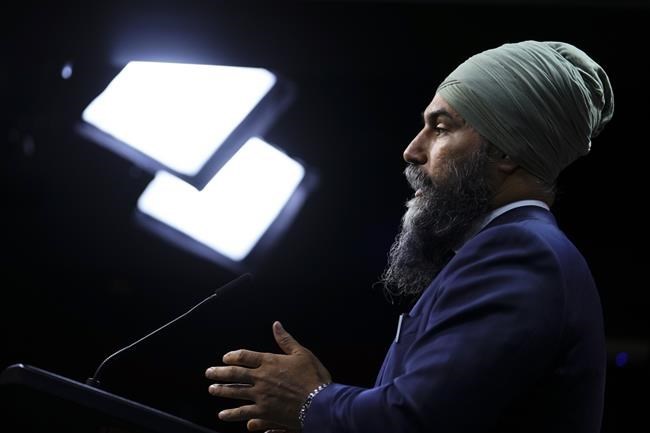OTTAWA — No longer content to wait for the Liberals to make good on their promise, the New Democrats tabled their own pharmacare legislation in the House of Commons Tuesday.
The NDP and Liberals struck a confidence-and-supply agreement last year that would see the NDP support the government on key votes to hold an election off until 2025 in exchange for progress on NDP priorities.
One of the conditions of that deal was that the Liberals make progress toward a universal pharmacare program by passing legislation before the end of this year.
NDP Leader Jagmeet Singh and his health critic Don Davies have since questioned the government's commitment to pharmacare.
"We found that with this government, even if we got things in writing, it's not a guarantee," Singh said at a press conference Tuesday.
"We've got to continually fight, put pressure, push them to deliver."
Davies pointed to recent developments at Canada's patented drug price regulator that saw major drug price reforms put on indefinite hold.
"The health minister suspended measures that would lower the cost for Canadians because the pharmaceutical industry demanded it," Davies charged.
Late last year, Health Minister Jean-Yves Duclos wrote to the chair of the regulator to askthat the board consider pausing the consultation period on the changes to give drug companies, patient groups, provincial ministers and himself more time to understand the changes.
The letter caused a rift on the Patented Medicine Prices Review Board that ended with the resignation of several board members. Duclos has repeatedly denied putting undue pressure on the independent regulator.
"We're deeply concerned and I think that there's not enough attention paid to this issue. This is shocking," Singh said.
The government is still consulting with provinces and experts on its own pharmacare bill, Duclos confirmed Tuesday, and plans to table it by the end of the year.
"Lots of work yet to be done to be able to table that bill by the end of the year," Duclos said on his way into a cabinet meeting Tuesday.
While the agreement between the Liberals and the NDP specifically called for the bill to be passed by the end of the year, Duclos said he can't guarantee that will happen.
"This is a minority government. We don't obviously control the House of Commons, but we'll do all we can to be able to both table and to pass the bill by the end of this year," he said.
The Liberal-NDP deal was not specific about the content that should be included in the bill.
The NDP version of the bill stipulates that a federal pharmacare program must be universal, single-payer and public, and Singh said the NDP expected the government to follow those principals when they negotiated the deal.
"They knew very well what we meant, and so they're on notice," he said. "We've provided a path forward for them and we now are going to wait and see what the government does."
The NDP bill is based on recommendations in a report commissioned by the government from the Advisory Council on the Implementation of National Pharmacare, led by Dr. Eric Hoskins, Davies said.
The Hoskins report made the case for single-payer pharmacare, but Davies said the Liberals have not yet committed to that.
If passed, the bill would not force the government to provide pharmacare, but would set the parameters for how its delivery would work.
The NDP legislation also calls for the government to establish an independent drug agency to advise on which drugs should be insured and how prescriptions drugs should be used.
It would also require the government to monitor the safety and effectiveness of drugs and to negotiate price and supply arrangements with drug manufacturers.
The government is already in the process of setting the mandate for such an agency.
In 2021, Ottawa tapped former interim Ontario Health CEO Susan Fitzpatrick to lead the development of a future Canadian Drug Agency. That work appears to be ongoing.
This report by The Canadian Press was first published June 13, 2023.
Laura Osman, The Canadian Press



